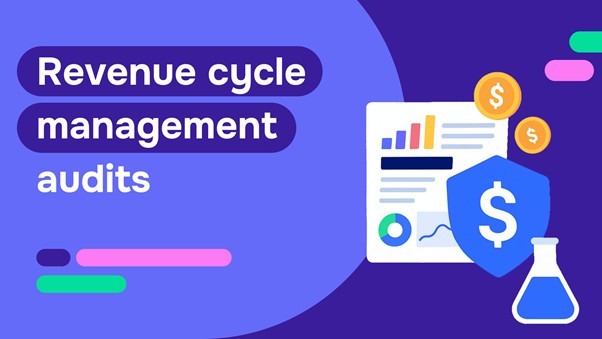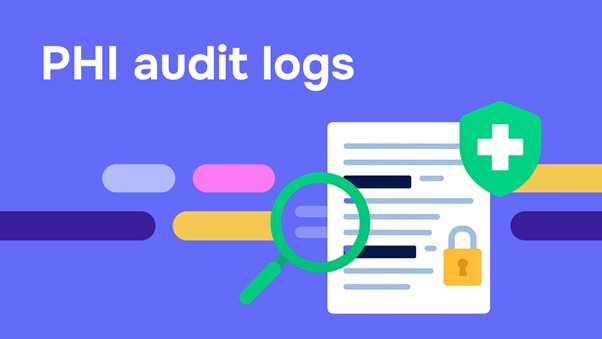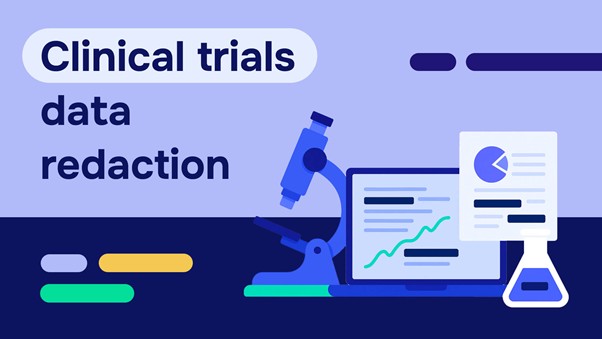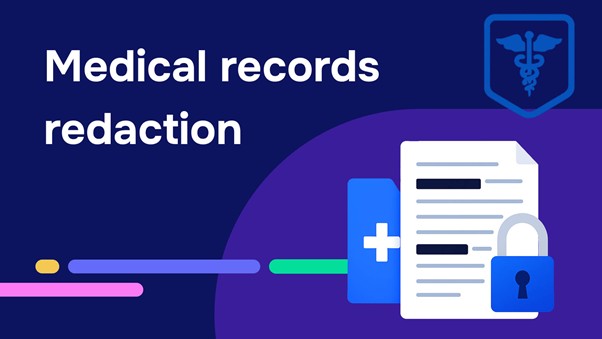AI redaction software for healthcare data security

To maintain compliance with healthcare data security regulations like HIPAA and avoid $240,000 fines, you must protect your digital health records. However, with 88% of office-based physicians using electronic medical records and 70% of hospitals exchanging and receiving care records digitally, safeguarding patient information has never been more critical or complex. With high-profile healthcare breaches continually hitting the headlines, 75% of patients are now worried about the privacy of their health records.
The challenge that many in healthcare currently face is that traditional security processes like blacking out with permanent markers and using primitive PDF editing tools are far too slow, expensive, and prone to human error. These approaches also put patient data at risk, and leaves it available for potential bad actors to exploit. For example, PDF editing tools do not actually remove patient data, but simply cover it with graphic elements. However, there is an effective solution.
AI redaction software for healthcare is the superior alternative, offering a cutting-edge solution for healthcare data security by enabling service providers to efficiently and effectively secure patient records. Keep reading to learn more about how AI redaction for EHR is helping providers ensure data security in healthcare by streamlining compliance, protecting patient privacy, and improving data management processes.

Recognizing the importance of data security in healthcare
Maintaining compliance with data protection rules is about more than just avoiding fines; it’s essential to ensuring patient confidentiality and trust. Respecting patient confidentiality and securing the privacy of patient health information is legally required - under HIPAA, patients have a right to privacy regarding their personal health information. It’s also an ethical obligation, and healthcare providers are bound by professional codes to prevent harm and uphold the autonomy of patients to make informed decisions about who has access to their sensitive data. Lapses in medical confidentiality can lead to legal action, reputational damage, government investigations, and the loss of contracts with insurers or other organizations.
The role of the Health Insurance Portability and Accountability Act (HIPAA)
Understanding HIPAA is essential for safeguarding patient confidentiality effectively. Passed into law in 1996, this regulation provides stringent protections for the privacy and security of patient medical information. A range of organizations must comply with HIPAA, including:
Healthcare providers: Including doctors, hospitals, and clinics that provide medical care and handle patient health information.
Health plans: Organizations that offer or pay for medical care, such as insurance companies or government programs like Medicare.
Healthcare clearinghouses: Entities that process medical information between providers and health plans to ensure smooth data exchanges.
Third-party service providers: Companies that offer services like billing or IT support, involving access to health information.
Cloud service providers: Firms that offer data storage or cloud computing services where health data may be stored or processed.
Subcontractors: Organizations hired by business associates to perform services that require handling protected health information.
The essential HIPAA compliance requirements related to data protection are specified in the Privacy Rule. This limits how covered entities can use or disclose private health information without patient consent and requires the redaction of 18 types of data to de-identify protected health information (PHI):
- Names
- Geographic data
- Dates
- Phone numbers
- Fax numbers
- Email addresses
- Social Security numbers
- Medical record numbers
- Health plan beneficiary numbers
- Financial or healthcare account numbers
- Certificate/license numbers
- Vehicle identifiers (license plate numbers)
- Medical device identifiers and serial numbers
- Web URLs that link to personal information
- Patient IP addresses
- Biometric identifiers (fingerprints, facial scans, or voice prints)
- Full-face photos and comparable images
- Any other unique identifying number or code
How does AI redaction software help with healthcare data security?
AI redaction software is fundamental for ensuring data security in healthcare because it efficiently conceals sensitive medical information, protecting patient privacy and maintaining HIPAA adherence even in the event of a data breach.
Healthcare providers are faced with a growing volume of digital health records that must be carefully redacted before they can be transmitted or exchanged. Going through these documents manually and searching for every instance of one of 18 different identifiers is not only tedious; it’s impractical and ineffective. By using automated redaction for healthcare documents, companies can:
Enforce healthcare data security
Healthcare data breaches stem from various causes, including hacking, insider threats, lost or stolen devices, and phishing attacks. AI redaction software reduces the damage caused by breaches by automatically detecting and removing PHI from medical records, so that even if the worst happens, the amount of sensitive information that can be exposed is minimal.
Combat medical identity theft
Medical identity theft occurs when someone unlawfully uses another person’s health information to obtain medical services, prescriptions, or insurance benefits. This is typically achieved by means of stolen medical records. Using an AI redaction tool for medical records helps to safeguard against medical identity theft by eliminating sensitive information from documents before they are shared or stored.
Ensure compliance
Helps healthcare providers meet strict HIPAA compliance requirements for handling patient data by automatically identifying and redacting all 18 types of protected health information (PHI). This includes names, dates, medical record numbers, and other identifiers that could potentially be used to identify a patient.
Streamline PII redaction
Optimizes the redaction process by automating the identification and removal of sensitive information, allowing healthcare staff to focus on patient care rather than manual document processing. AI can process thousands of documents in minutes, a task that would take human workers days or weeks to complete manually.
Reduce human error
Minimizes the risk of accidentally disclosing sensitive information due to oversight or fatigue. AI doesn't get tired or distracted, maintaining consistent accuracy even when processing large volumes of data. This is crucial in healthcare, where a single missed redaction could lead to a privacy breach.
Encourage research
Supports sharing anonymized medical data for studies while upholding patient confidentiality. AI redaction can create de-identified datasets that retain valuable medical information while removing all personally identifiable details, facilitating important medical research without compromising patient privacy.
Enable secure data sharing
Allows secure exchange of patient information between healthcare providers and institutions, improving the availability of information to enhance patient care. AI redaction can quickly prepare documents for sharing, ensuring that only relevant, non-sensitive information is transmitted. This can improve coordination of care and reduce delays in treatment.
Maintain data integrity
Preserves the structure and readability of medical documents while removing sensitive content. Unlike manual redaction, which can sometimes obscure too much information or disrupt document formatting, AI redaction tools can intelligently redact only the necessary information while maintaining the overall context and structure of the document.
The must-have AI redaction features for healthcare organizations
Automated redaction software is transforming how healthcare organizations protect patient data, helping them navigate the complexities of stringent regulations and ensure healthcare privacy. However, with so many redaction tools on the market, it’s important to choose the right solution for your industry. Here are the key features every organization in healthcare should look for when comparing PII redaction software:
Intelligent PHI detection: Uses machine learning algorithms to accurately identify various types of protected health information across different document formats.
Customizable redaction rules: Allows healthcare providers to set specific criteria for redaction based on their policies and regulatory requirements.
Optical character recognition (OCR): Enables redaction of handwritten notes and scanned documents commonly found in medical records.
Audit trail and reporting: Generates detailed audit logs of redaction activities for compliance and quality assurance purposes.
Seamless integration with EHR systems: Smoothly works with existing electronic health record platforms for streamlined workflow.

Why Redactable offers the best redaction software for helthcare
Maintaining patient confidentiality is essential for complying with laws like HIPAA, and meeting ethical requirements for protecting patient privacy and autonomy. However, many healthcare providers underestimate the need to efficiently and securely redact patient medical records before they are exchanged. Poor redaction processes can result in delays and costly errors, as overworked staff members fail to catch every instance of PII. Instead of manually scrolling through hundreds of digital pages in PDF documents, healthcare providers need an AI redaction solution.
Our AI redaction software for healthcare is specifically designed to meet the complex needs of organizations like yours. Redactable offers:
Advanced PHI detection algorithms
Accurately identifies and redacts over 21 types of protected health information across various document formats.
Intuitive interface for healthcare professionals
User-friendly design requires minimal training, allowing quick adoption by medical staff for enhanced data protection.
Customizable healthcare-specific redaction rules
Allows fine-tuning of redaction criteria to match specific institutional policies and regional regulations.
Smooth EHR integration
Compatible with major electronic health record systems for streamlined workflow and data management.
Comprehensive audit trails
Provides detailed logging of all redaction activities, supporting compliance efforts and internal quality control.
High-volume processing capabilities
Efficiently handles large volumes of medical records, ideal for research data preparation and mass record transfers.
Multi-layer verification system
Incorporates automated checks and optional human review to ensure redaction accuracy for critical documents.
Learn more about how Redactable can revolutionize your healthcare organization's data security practices by signing up for a free trial today.
Interested in learning more?
Frequently asked questions
AI redaction software uses advanced algorithms to identify and redact sensitive information in healthcare documents. By automating the redaction process, it helps healthcare providers maintain data privacy, comply with HIPAA, and minimize human error, all while streamlining document management.
Redaction is essential for protecting patient privacy, ensuring compliance with regulations like HIPAA, and preventing unauthorized access to personally identifiable information (PII) and protected health information (PHI) in patient records. Proper redaction helps prevent data breaches and medical identity theft.
Yes, many AI redaction solutions, including Redactable, are designed to integrate seamlessly with Electronic Health Record (EHR) systems, allowing healthcare providers to manage redaction workflows efficiently within their existing platforms.
Yes, Redactable's advanced AI redaction software supports multiple formats, including PDFs, scanned documents, and even handwritten notes, using OCR (Optical Character Recognition) to identify sensitive information for redaction.
Redactable offers industry-specific features like advanced PHI detection, customizable redaction rules, and seamless integration with EHR systems. Its user-friendly interface, high-volume processing capabilities, and detailed audit logs make it an ideal choice for healthcare providers focused on data security and compliance.







